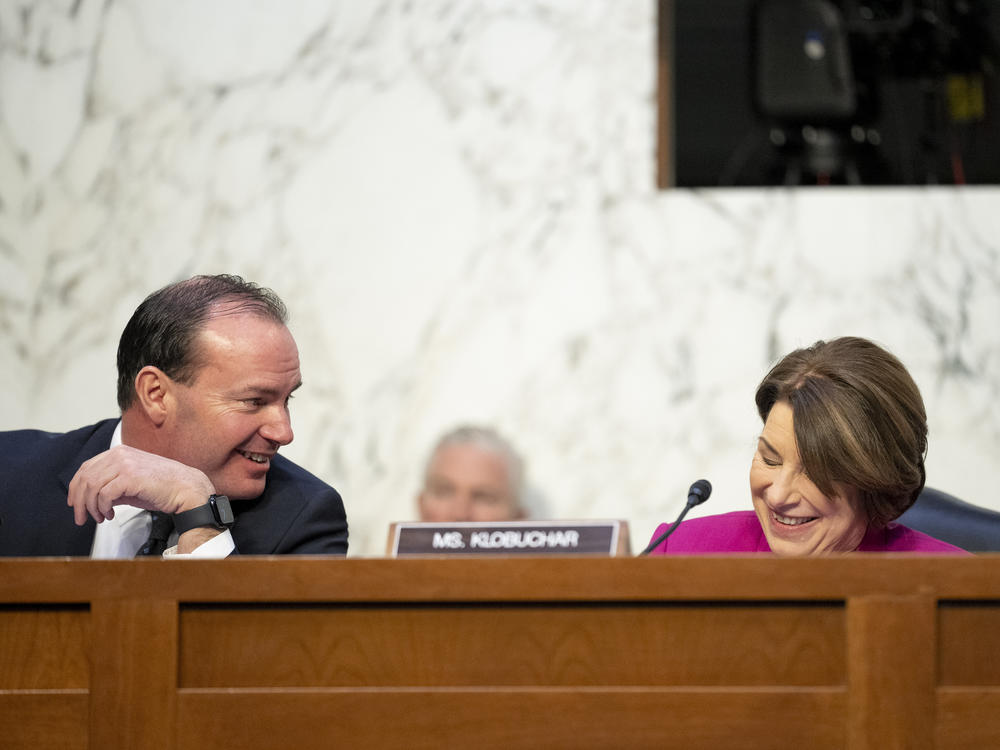Section Branding
Header Content
Senators are calling on the Justice Department to look into Ticketmaster's practices
Primary Content
Updated February 23, 2023 at 3:30 PM ET
Almost exactly one month after senators held a hearing on issues in the ticketing industry, they are calling on the U.S. Department of Justice to continue examining what they call the "anticompetitive conduct" of Ticketmaster and its parent company, Live Nation.
The ticketing giant came under renewed scrutiny after the Taylor Swift presale debacle in November, which prompted widespread accusations of monopolistic behavior (as well as several state consumer protection investigations and a fan-led antitrust lawsuit).
The Justice Department had reportedly opened an antitrust investigation into the company even before that ill-fated sale. NPR has reached out to Justice Department for comment.
Live Nation has acknowledged areas of improvement, especially when it comes to bots and scalpers, but has repeatedly — both in written statements and congressional testimony — denied engaging in behavior that would justify antitrust litigation or changes to its business practices.
On Thursday, the company issued a new statement urging people to "focus on the facts." Live Nation has submitted "more than 35 pages of information" in recent weeks in an effort to provide context and transparency to policymakers "on the realities of the industry," it said.
"We believe that policymakers would benefit from asking more questions about the chaos caused by scalpers and the resale-first side of the industry," the statement added.
The company says it supports reforms to ticketing practices, including those it has outlined in a proposal it called the "FAIR Ticketing Act."
Live Nation's efforts have evidently done little to assuage the concerns of lawmakers on both sides of the aisle who have demanded answers and now say they aren't satisfied with what they've gotten so far.
Sens. Amy Klobuchar, D-Minn., and Mike Lee, R-Utah — who lead the Senate Judiciary Subcommittee on Competition Policy, Antitrust, and Consumer Rights — sent a letter on Wednesday to the Justice Department presenting evidence from the January hearing and urging it to follow up on unanswered questions.
Writing to Jonathan Kanter, the assistant attorney general for the Antitrust Division, the senators stressed that all of the witnesses except for Live Nation's president had testified that the company's practices harm the music industry. And they said Live Nation hasn't sufficiently responded to all of their questions, both at the hearing and after.
"Live Nation's responses amount to 'trust us.' We believe that is wholly insufficient," they wrote. "We thank you for your prompt attention to these matters and encourage the Antitrust Division to take action if it finds that Ticketmaster has walled itself off from competitive pressure at the expense of the industry and fans."
These are the questions that lawmakers want answered
The senators' letter is divided into two main lists: allegations against Ticketmaster and follow-up questions to which they found the company's response lacking.
The hearing featured testimony from antitrust experts, entertainment company executives and a musician, who collectively painted a picture of an industry that is dominated by one oversized company at the expense of fans, venues and artists.
Some of the issues they raised involved Live Nation's pricing models and fees, increasingly long contracts with competitors and alleged retaliatory behavior against artists and venues that don't want to work with it.
Lawmakers in the room seemed to agree that the company's dominance poses a problem in the industry, even if they had different ideas for how to address it. After the hearing, the subcommittee leaders sent Live Nation a letter with seven additional questions, requesting a response by Feb. 15.
"As the hearing demonstrated, there is a strong bipartisan consensus about taking steps to improve the way America's ticketing industry functions," they wrote. "We must ensure that we have competition in the market to drive down prices, encourage companies to innovate, and give consumers choice."
In a 38-page response dated Feb. 14, Live Nation claimed that both primary and secondary ticketing markets are "highly competitive."
"Ticketmaster remains the largest primary ticketing company, but it has steadily lost market share and has lowered pricing despite having by far the best product in the industry — sure signs that it is not the monopolist that some claim," it said.
The letter, signed by executive vice president for corporate and regulatory affairs Daniel Wall, also urged Congress to take action against bots, to ban fraudulent resale practices and to mandate the ability for artists and other event providers to set their own resale terms on all ticketing websites.
But Klobuchar and Lee say Live Nation "largely failed" to answer lawmakers' questions.
Senators asked how many concerts each year were promoted by Live Nation and ticketed by Ticketmaster. It says the company said it was "unable to determine" the answer "in the time available" but did not ask for an extension.
They also asked Live Nation if it would commit to having third-party audits to confirm that it isn't retaliating, in threat or actuality, against venues that pursue other ticketing providers.
Lawmakers say Live Nation refused, responding: "Live Nation does not need to be subject to a consent decree or any similar legal obligation to refrain from retaliating against a venue for using another company's ticketing services, and from threatening to retaliate for such choosing of another ticketing company."
There are also several questions that senators say Live Nation didn't answer at all, including about how many of the top 100 arenas it provides ticketing services for and whether it's entered into any agreements with venues where the contract term for ticketing services is longer than five years.
The Justice Department has not confirmed or commented publicly on a potential antitrust investigation into Live Nation, though Klobuchar and other senators have said that the evidence gathered at their recent hearing could be useful for such a probe — as well as for passing legislation in this area.
Copyright 2023 NPR. To see more, visit https://www.npr.org.

